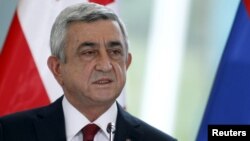Armenians voted in a referendum to boost the prime minister's powers, results showed on Monday, a move supporters say will bolster stability but opponents warn will entrench the ruling party's control over the ex-Soviet state.
Observers from the Council of Europe rights group reported problems with the voting lists and other irregularities, and said that the low turnout suggested many voters saw Sunday's referendum as a piece of political maneuvering.
The ruling Republican party, which called the vote, said minor violations could not affect the result.
The changes, due to come into force after elections in May 2017, will broadly curb the role of the historically-powerful president and give more authority to the prime minister and parliament.
The opposition says the changes are a ruse to let President Serzh Sarksyan slip into an enhanced prime ministerial role at the head of the Republican Party after his presidential term ends in 2018.
He has regularly denied this.
"We can say today that the parliamentary system is a reality. It means strong government, strong opposition and strengthening of the role of political parties," Sarksyan told a meeting with officials, politicians and public figures.
Opposition activists took to the streets of the capital Yerevan overnight with many saying there had been polling violations. Police stopped crowds trying to reach the central election commission's office.
The protest resumed on Monday with about 4,000 people gathering in the capital's central square and then marching in the streets.
"I'm sure that people will unite and will be able to remove this regime in order to create Armenia of our dreams," one of the opposition leaders, Jerair Sefilian, told the crowd.
Opposition activists said protests would continue.
Just short of two thirds - 63.35 percent - of people who did vote on Sunday supported the proposed changes to the constitution, according to preliminary results, easily more than the simple majority needed.
Observers from the Council of Europe's Parliamentary Assembly (PACE) said the relatively low turnout, around 50 percent of the voting population, reflected the fact that "the referendum was driven by political interests instead of the needs of the Armenian public and was perceived by many citizens as a vote of confidence in the government."
The PACE monitors also said there had been violations, including inaccurate voting lists, allegations of large-scale organized vote-buying and the misuse of administrative resources by executive bodies. It did not say who had made those allegations.
"The delegation urges the authorities to address these issues in order to build trust in the voting process and in politics in general to ensure a genuinely democratic future for Armenia," PACE said in a statement.
Under the changes, the president will no longer be elected by popular vote, but by parliament. The winner will stay in the job for seven years instead of the current five, but will have only largely ceremonial powers.





